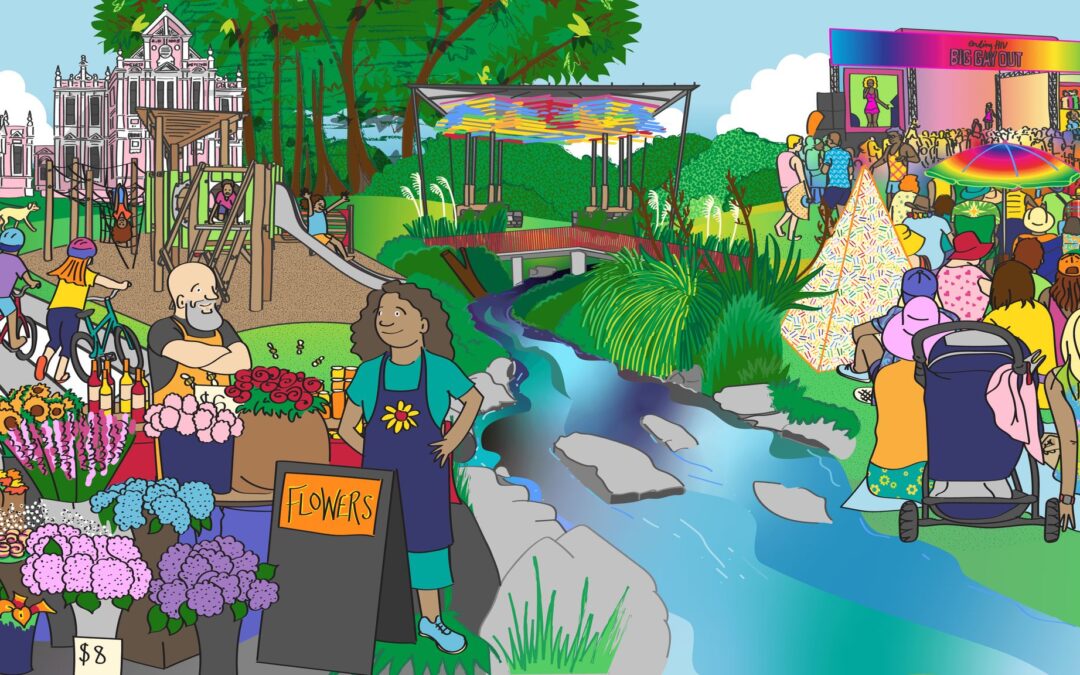Feedback is now open on Auckland Council’s Long Term Plan.
Please have a read of our guide to giving feedback here
The final section asks for feedback on Local Board priorities. City Vision elected representatives share what they wish to achieve for the local areas.
Albert-Eden Local Board
The Albert-Eden Local Board area extends from Pt Chevalier to Greenlane and is home to 100,000 people, 7 town centres, 3 maunga, 2 awa and borders the Waitematā Harbour.
Fairer funding for local boards, as proposed in the LTP, will give us the first opportunity in a decade to deliver more of what is needed for our community and environment.
Over the next 10 years we want to cater for our growing population. We need to deliver new parks (for instance, in the Carrington development, which will have over 6,000 new homes), build a new library/community centre in Pt Chevalier (noting the current library is leaking and so is closed). We need to repair our buildings and repair our flood-damaged parks. We want to better support volunteers, those working in our environment, Māori priorities, the CAB, the arts, events and to push for better public transport, town centre environments and walking and cycling.
In the first year, our priority is to deliver key projects and activities. Some of these include:
- the environment through; tree planting, parks restoration, support volunteer pest control and planting groups and consider making our parks bin-free like Regional Parks so we can minimise waste and put the resulting financial savings towards restoration and improve environmental outcomes
- Supporting community climate action
- Plan on acquiring new parks to respond to growth and making the most of the parks we already have
- Supporting community groups
- Deciding a location for the Point Chevalier library and how we will fund it
- Activities (like small markets) in the Mount Albert Civic Square
There are many more projects we want to consider, so do let us know what would make a difference in your local area.
Puketāpapa Local Board
The “Do More” proposal supported by City Vision will see more investment into Environmental Protection programmes, including near full delivery of the Regional Pest Management Plan. An example in the local board area which would benefit from this is our treasured natural spaces such as the Waikōwhai Coast, having work be done to remove the high level of weeds and animal pests in this area will make them even better.
One initiative to be cherished is the introduction of a 50 dollar a week cap for public transport. With the massive cost pressures on our people, keeping travel costs to a minimum is a welcome initiative.
We support resuming the Natural Environment Targeted Rate (NETR) and Water Quality Targeted Rate (WQTR), as well as discontinuing the Long Term Differential Strategy to ensure businesses pay their share to support the city.
The “Do less” programme would see Tāmaki Makaurau go backwards – massive cuts to transport, environment programmes, infrastructure like underground pipes and stormwater, programmes to fix storm damage like the massive damage in the currently closed Waikōwhai Coast boardwalk and tracks, reduction in opening hours of council facilities, and the selling off of libraries and pools. We need to fight for Roskill’s fair share; historically our area has not had the investment seen in other areas so we need more investment, not less, especially in the face of rapid growth over the next 10 years
Waitematā Local Board
The City Vision members of the Waitematā Local Board are keen to retain our range and quality of Council services and facilities. We strongly support progressing the Ponsonby Park project and the community approved design to restore and upgrade the Leys Institute library and hall. We want the climate change targeted rate to increase our tree canopy, to increase the electric ferry and bus fleet and expand bus and train services, in part to combat climate change, in part to create a well-functioning city that is a great place to live.
We support the water quality and environmental targeted rates to clean up our streams and harbours, to maintain biodiversity and combat kauri dieback disease and caulerpa. We have put funds into a range of community initiatives to improve the environment. And we want to build community and social cohesion, to improve wellbeing, and reduce crime, anti-social behaviour and mental distress in the years ahead.

